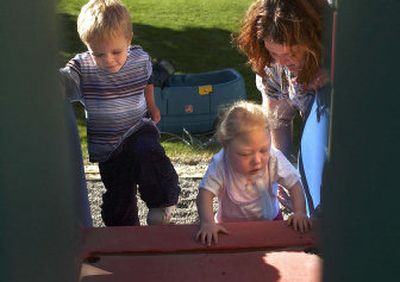Children FIRST

Children, no matter their abilities, are children first. That’s the guiding principle behind a local early-intervention program, where children who are developing typically and those with developmental delays learn together. At Children FIRST, which serves children from birth to 3, therapists are treating both types of children in settings where they can interact, a method that research has proved to be extremely effective.
“We have so many children without delays or disabilities as peer models,” said Kathy Blair, the program’s executive director. “When there’s integration, children don’t see themselves as different, they see the similarities.”
Rather than segregate the children with disabilities, Children FIRST services are administered within the child-care program at the Spokane Child Development Center, 3803 N. Sullivan Road. About 40 children a month participate in the early-intervention services, and about half have disabilities, Blair said. The other children are enrolled in the child-care program.
In this integrated environment, there is focus on the whole child rather than on a child’s disabilities, Blair said.
In fact the Individuals with Disabilities Education Act (part C) requires that as far as is appropriate for the child’s needs, early intervention should be provided in “natural environments, including home and community settings, in which children without disabilities participate.” The natural setting is defined as any inclusive area where young children would normally be.
Children who receive early intervention services can attend on Tuesday and Thursday or Wednesday and Friday for two and a half hours. Therapists also make home visits. Children must have at least a 25 percent developmental delay to qualify for the services, which are free.
Funding is provided through contracts with the East Valley School District, Spokane County Community Services, the Infant Toddler Network and billing Medicaid and private insurance, Blair said.
Children work in small groups with therapists on skills such as communication, language and play, fine motor skills like touch, and gross motor skills like jumping, climbing stairs and running.
Children FIRST is a good model for other state programs because of its incorporation of the best of current research, said Sandy Loerch Morris, program director of the Department of Social and Health Services Infant Toddler Early Intervention Program.
“Peers are very strong teachers,” Loerch Morris said. “Kids learn from each other even faster than they do from adults. They’re also a big motivation factor.”
Shawn Triber, a physical therapist at the center, said she asks children who are developing typically to model some of the actions she would like the others to learn.
“They’re more apt to try things, I think, than if it’s just me working with them one-on-one,” said Triber, who helps the children with gross motor skills.
Developmental Specialist Carey Gibbons focuses on the children’s cognitive development. Part of the treatment involves role play and demonstrations such as pretending to talk on the phone.
“A lot of kids with disabilities don’t naturally acquire pretend play. They need to be taught,” said Gibbons. “Typical kids do it on their own.”
Having the peer model has many benefits over nonintegrated settings, the therapists said.
“Many children throughout the year make enough developmental gains that they no longer qualify for early-intervention services,” Blair said.
The inclusive program’s success has been especially evident with Mataiah Achziger. The girl, who turns 3 at the end of October, started center-based treatment in September, after receiving home-based care.
Mataiah has a condition that makes her joints lock so she cannot walk. Born prematurely, she had a tracheotomy to help her breathe, and she cannot talk. As she moves across the floor, with a tube trailing from her oxygen tank, it is hard to believe that this active little girl only just started to crawl.
Yet, before she started therapy here, Mataiah barely moved and didn’t know how to play.
“Mataiah was never supposed to do anything. She was just supposed to sit there,” said her mother Dusti Achziger, adding that doctors had said that she wouldn’t even live. “She could never even smile.”
Now with the help of therapists and her little friends, Mataiah is mobile and eager to explore new things. She is also learning sign language since she can make only simple sounds.
“She’s rather be on her knees and crawling around the table than sitting down,” said her nurse Kathryn Bader. “By imitating the other kids, she is learning how to use playdough and do puzzles … She is learning the sign for ‘friend’. “
She even pretends to eat, something she cannot do because she is fed through a tube in her stomach. Bader said she still hasn’t learned the skill of swallowing and breathing at the same time.
“She doesn’t see herself as limited. She acts like any kid her age,” Bader said.
Mataiah interacts well with the other children, evidence of the tolerance young children have for each other, Blair said.
“I really wanted her to be in school,” said Gibbons, who previously worked with Mataiah at home. “For her to be around other kids and just be a kid herself is really important.”
The therapists hope she will be well prepared to start preschool five times a week in November.
“Without the therapy, I don’t know far she would have come. With the therapy she’s been able to rewire her brain (to learn things)” Achziger said. “She’s a miracle baby.”
Helping children develop new skills early in life is essential to their development, especially their social and emotional growth, Blair said.
“Seventy percent of what they’re going to learn in a lifetime is learned in the first three years of their life,” she said. “Everyone’s future success in life is based on their social skills.”